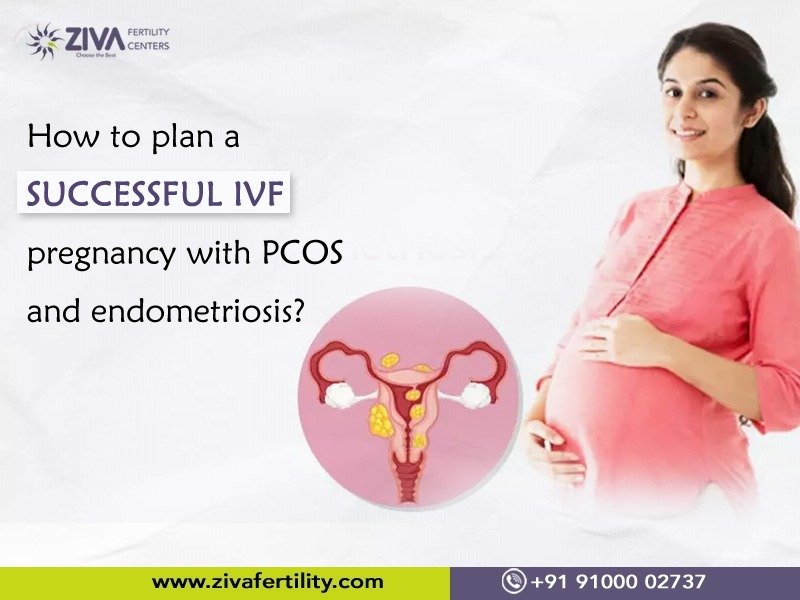Infertility is a big concern in this fast-growing ultra-technology world, where almost 1 out of 6 couples are suffering from infertility issues. In women, PCOS and Endometriosis are significant reasons for infertility. Polycystic Ovarian Syndrome accounts for 8-10% of women’s infertility, and Endometriosis accounts for 10-15% of female infertility issues.
How do Endometriosis and PCOS Affect Fertility?

Endometriosis and PCOS commonly affect reproductive organs and cause hormonal imbalances, but they are quite different.
In Endometriosis, a tissue resembling the lining of the uterus (Endometrium) grows outside of the uterine cavity, on the ovaries, bowel, or the tissues lining the pelvis. This external tissue growth irritates the surrounding tissue and causes fibrous scar tissue in the adjacent organs, like ovaries. Women with this condition have a lot of pain during their periods. Some women, for unexplained reasons, have endometrial tissue growth outside the ovaries, which limits the discharge of eggs. In some women, the same tissue grows over the fallopian tubes, which stops the sperm from approaching the egg or prevents the fertilized egg from traveling back to the uterus. We at ZIVA Fertility Clinics suggest IVF treatment for such cases for expected outcomes. But around one-third of women with Endometriosis may have a baby with no cure at all. However, in cases where natural treatment is not possible, IVF is the best choice.
PCOS is a hormonal imbalance condition where women have higher levels of “male hormones,” known as androgens. The symptoms manifest as excessive hair growth and acne and can prevent ovulation, resulting in irregular periods. Women with PCOS also experience insulin resistance, increased blood sugar levels, and weight gain.
Both conditions can occur simultaneously since the excess androgens responsible for PCOS can lead to excess estrogen, which increases the risk of Endometriosis.
Why does PCOS or Endometriosis impact pregnancy?

The hormonal imbalance caused by PCOS causes the overproduction of androgens, which arrests ovulation. High androgen levels reduce the egg quality, further decreasing the chances of conception/pregnancy.
In Endometriosis, excess endometrial tissue restricts the release of eggs if the ovaries are involved in forming the endometrial lining. The built-up endometrial tissues outside the uterus cause an excruciating swelling and accumulation of blood-filled cysts in the ovary. Egg quality and, as a result, embryo quality are compromised.
Although each of these situations could seem difficult, experts advise that IVF treatment is a solid choice to achieve the desired results.
Treatment options for Endometriosis and PCOS
Both endometriosis and PCOS treatments help with symptom management and fertility but may not cure it completely. One can try the following:
- Lifestyle modification and embarking on the journey of yoga, meditation, and exercise right away.
- A special PCOS diet and endometriosis diet are good for weight management, reducing hormone levels, and relieving pain.
- Medication for pain relief caused by Endometriosis and PCOS.
- Hormone therapy
- Laparoscopic surgery for ovarian drilling in PCOS and Adhesiolysis in Endometriosis
- In Vitro Fertilization (IVF) for those aiming at pregnancy
- The steps in the IVF procedure are:
- Ovulation-stimulating hormones stimulate the internal reproductive organs to discharge many healthy eggs. This is the first difference between IVF and conventional pregnancy, wherein a single egg is launched and then ovulated.
- The eggs are extracted, artificially inseminated, and fertilized in a lab’s lab’s petri dish.
- The embryos are developed, and genetic testing is performed on them.
- Healthy selected embryo(s) are transferred to the uterus of the lady.
- IVF allows for controlled ovulation, fertilization, and implantation; hence, it helps women with PCOS and Endometriosis to get pregnant.
- Giving up smoking and alcohol and reducing caffeine intake.
FAQs about How to plan a Successful IVF pregnancy with PCOS and endometriosis?
- What success can one expect with IVF for PCOS?
IVF is one of the most popular options to get pregnant with PCOS. For IVF with PCOS, there is around 70% conception success and a 60% live birth rate.
- Are PCOS and Endometriosis the reasons for implantation failing in IVF?
The most common cause for implantation failure in IVF is the quality of the embryo. Substandard embryos don’t implant after getting transferred to the uterus.
- Can a woman with PCOS get pregnant without medicines?
Yes, there are instances where women get pregnant without medications, even with PCOS. Such a decision can be taken only after consulting with our expert fertility specialists at ZIVA fertility clinics.
- Can IVF succeed with Endometriosis?
IVF is usually the ideal plan for infertility patients with Endometriosis, although you might need cautious monitoring of the fertility medicines. If overdone, these fertility medications can briefly worsen endometriosis signs or symptoms. If the patient underwent surgery to cure Endometriosis, then it’s best to wait for 6-25 months before starting the IVF.
- Will Endometriosis affect the implantation in an IVF?
Since the endometriosis lining has scar tissue in endometriosis, it can affect the implantation of an embryo.
- Will IVF help in reducing PCOS symptoms?
One of the surprising effects of IVF is that IVF treatments can give temporary relief from PCOS symptoms. Women have told us that they have experienced reduced pain and cramps.
If women are experiencing any of the above symptoms, get an expert consultation from ZIVA Fertility clinics to manage the conditions. We have decades of experience in helping women with both PCOS and endometriosis conceive through IVF.
For more information, please visit our website https://zivafertility.com/ or contact us at +91-9100002737 or +91-9347406900.
















